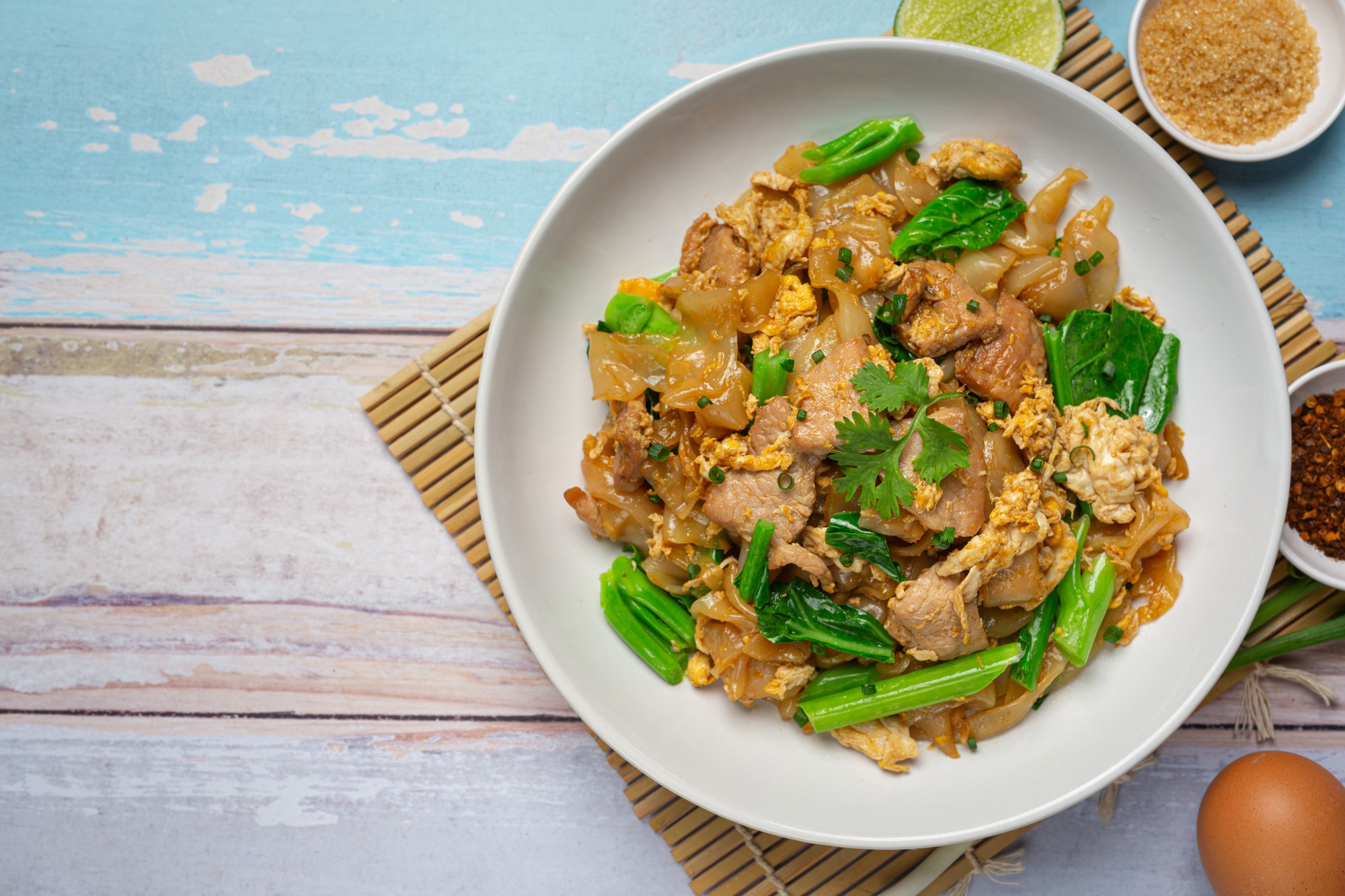The traditional Thai-Chinese meal Makheua yao pad tao jiao, which combines stir-fried eggplant with minced pork, is one of my favorite ways to consume eggplant. The simple yet flavorful dish is frequently served at the khao gaeng curry and rice stalls but is also quite often prepared at home. It is flavored with tao jiao (fermented yellow bean sauce), garlic, fresh chiles, and Thai sweet basil, which has a licorice-like flavor.
Although it’s frequently linked with street food and restaurants, wok cooking is a result of Chinese influence in Thailand and has grown popular in contemporary cuisine. It’s especially common when cooking is done at a high heat to produce the smoky flavor known as wok hei.
I think it’s best to leave it to the powerful restaurant wok burners, even though home cooks can attain wok hei in their kitchens. Home cooks, in my opinion, should place more emphasis on other foundations of stir-frying, such as preparing a dish’s ingredients in smaller batches and combining them all at the end to avoid boiling them to mush.
Cooking Makheua Yao Pad Tao Jiao
I use a mixture of cornstarch, white vinegar, water, and salt to coat slices of eggplant. This acts as a barrier against enzymatic browning, a chain of chemical reactions that happens to some foods when their sliced surfaces are exposed to air. After that, I quickly fried the eggplant in hot oil to soften it while retaining its vivid purple color. As soon as the eggplant is done cooking, I brown the ground pork and combine it with the garlic and chilies before removing it and putting it aside to make the sauce.
To finish the dish, I quickly simmer the umami-rich sauce created with tao jiao, oyster sauce, and soy sauce, along with water and sugar to balance the flavor. I then throw the eggplant and pork back in. I cook everything together until the sauce is completely absorbed. This meal tastes great when served with fragrant jasmine rice and is garnished with Thai basil for a herbal kick.
Ingredients
For the Stir-Fry Sauce:
- 2 tablespoons Thai fermented soybean paste
- 1 tablespoon oyster sauce
- 2 teaspoons Thai or Chinese light soy sauce
- 1 teaspoon sugar
- 2 tablespoons water
For the Eggplant:
- 240ml vegetable oil, for frying eggplant
- 2 Japanese eggplant, stemmed and cut crosswise on a bias into small bits
- 1 tablespoon cornstarch
- 1 teaspoon distilled white vinegar
- 2 teaspoons of water
- Kosher salt
For the Stir-Fry:
- 150g ground pork
- 5 small-size garlic cloves, smashed and roughly chopped
- 2 to 3 fresh Thai chilies, stemmed and thinly sliced
- 1 packed cup (30g) fresh sweet basil leaves (a.k.a. Thai basil)
Directions
- For the stir-fry sauce: Add fermented soy bean paste, oyster sauce, soy sauce, sugar, and water in a small bowl and stir until well incorporated. Set aside.
- To prepare the eggplant: Line a rimmed baking sheet with paper towels. Place a strainer in a large heat-proof mixing bowl and place the bowl on a heat-proof surface. Heat the oil in a wok over high heat until it reaches 400°F (205°C). In a separate large mixing bowl, combine the eggplant, cornstarch, vinegar, water, and salt. Mix with your hands until evenly coated. Add half of the eggplant to the wok and cook, stirring constantly, for 30 seconds, or until just cooked through. Transfer eggplant to prepared baking sheet using a spider skimmer. Return the oil to 400°F (205°C), and fry the remaining eggplant. Once all of the eggplant has been fried, carefully strain all of the hot frying oil into a large mixing bowl and set aside to cool before discarding or reserving for another use. Return the wok to the stovetop.
- Return the wok to high heat until smoking for the stir-fry. Swirl the wok with 2 tablespoons (30ml) of the reserved eggplant frying oil to coat the bottom and sides evenly. Spread the pork in an even layer with the bottom of the wok spatula. Cook, stirring occasionally, until the pork is lightly browned on the bottom side, about 20 seconds. While stirring constantly, flip the pork and break it up into small pieces with the spatula in a chopping motion. Cook, stirring constantly, until the garlic and chile are fragrant, about 1 minute. Set aside the pork mixture in a small mixing bowl.
- Bring the wok back up to high heat and add the stir-fry sauce. Bring to a boil, then add the pork mixture and eggplant. Cook, stirring constantly, for 1 minute, or until the sauce is completely absorbed by the eggplant. Remove from heat and stir in basil until well combined and slightly wilted. Serve right away with cooked jasmine rice.
